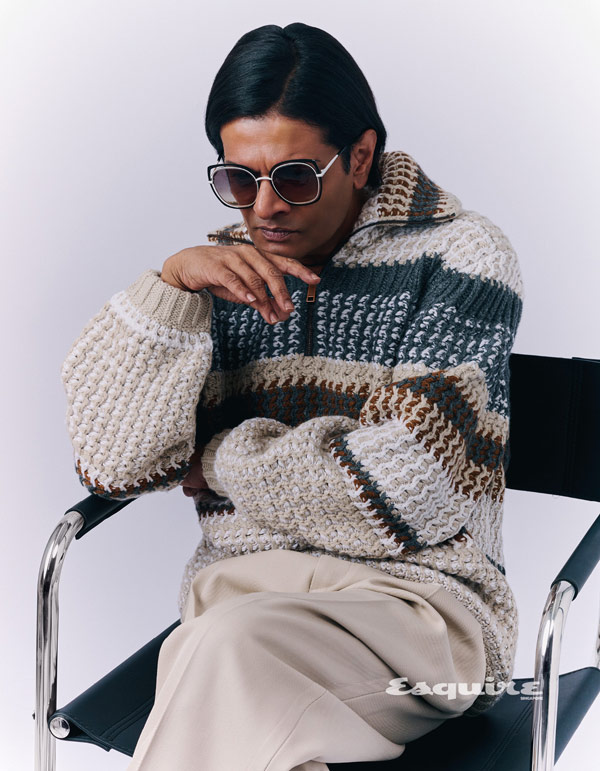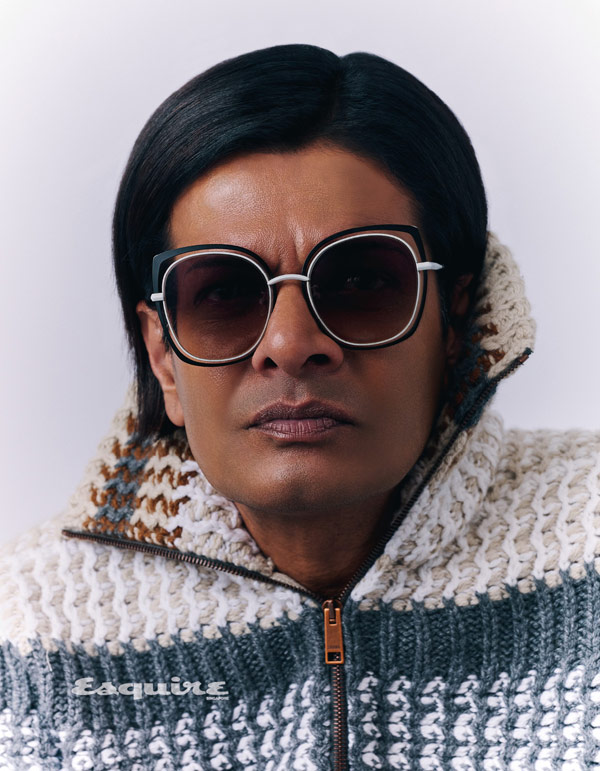
Much as he keeps pace with current affairs and generational trends, Kumar remains anchored by one old-school principle. It’s nothing too cryptic, given the nature of how he presents himself. No, Singapore’s most recognisable comedian refuses to be labelled.
"People never understood, only now they do,” he says, clarifying again that he’s a drag queen, not transgender. It’s performative, as anyone familiar with his origin story would know. The method began as a way to command attention (this was the ‘90s, remember?), and like the sharp wit it accompanied, stayed for good.
Off-stage, Kumar offers a stable contrast. The self-professed introvert strips away the razzle-dazzle not just physically, but emotionally too. Still, sparks of sass surface from time to time. “What’s the point of calling yourself [anything]? Does it make you feel better?” he asks, viewing today’s growing obsession with identity as troubling.
He is of the camp that these Western-hailing labels are but an admission to prescribe a lifestyle and frame behaviour. It’s fascinating that, amid the many controversial themes he has explored in his work, this is the one taboo the standup comic is adamant to exclude. Though candid about his sexual orientation and early trauma, he resists the alphabet mafia.
“Soon it will be A to Z. I really don’t know where this is heading. Is there a dead end? U-turn? It’s just not getting any better.” As the conversation flows at his mani-pedi session at AMK Hub, Kumar exhibits a motley of paradoxes. The 56-year old believes no one is bound by circumstance. It’s why he’s never touched a drug in his life, because choices have consequences.
Who we are now, he insists, is the sum of said choices. Yet he is convinced of a divine assignment, just as he was destined to be a comedian. It’s an ordained path we all eventually return to even if we stray (so too bad if you were called to be a criminal). “But I think people can redo their fate. They just need to work hard,” he adds, seemingly countering himself.
“There are no shortcuts in life." It’s a sentiment he feels the younger generation doesn’t quite grasp. Its driving force? The societal ill of envy. He participated in the pursuit of empty riches until his 40s, a defining chapter he often mentions in interviews.
“People don’t know what happiness is,” he reflects. “They think if they have this or that, they’ll be happy. But do you know the richest man in the world also got problem? They all got their own shit.”
“It’s never enough and [you’ll always] want more. By the time you get your first million, you knowhow many people you have to backstab? And it’s lonely at the top. Very sad, but that’s the world now.” For all his talk of doom and gloom, the entertainer finds humour in the antics of people. How unnecessarily uptight they can get, for one.
Focusing on the positives in life is key, hence the active decision to stay away from social media. “I really think some people like to be depressed,” he says of his volunteer chats with individuals suffering from depression during COVID. “They only make friends with people who are depressed so they won’t tell [them] otherwise. Sometimes they don’t want to get out.”
“People should just listen nowadays, more than giving a solution. Don’t advise, because you’re not an expert. I can only tell you from my experience, you have to decide whether or not you want to proceed.” In tandem, he then praises ITE and the Career Conversion Programmes as government initiatives he appreciates for supporting different means to forge forward. His deep-rooted patriotism can’t be hidden.
Him counting his National Day Parade performance a decade ago as a career milestone says a lot. He even entertained the idea of getting into politics during that era. Not so much these days, unless they create a “people person” role just for him, he half-jokes.“ People say Singapore's cost of living very high, but they go eat fine dining,” he observes, adopting a cadence familiar to his audience.
“You can still get wanton mee at four dollars. Government give[s] all the CDC voucher[s]. It’s only expensive because we compare.” The danger of expectations is another lesson from foster fatherhood. Expectations lead to disappointment, and disappointment to resentment. He cites his own mother’s bitterness as a cautionary tale. Still, Kumar hasn’t stopped hoping, because hope is positive.
He’s a strong advocate of having a peaceful mind and living at a slower pace. “Calm down. Every problem has a solution, why you always thinking negatively?” he raises. “You need to take care of yourself, don’t just ignore [the problems], because you don’t know what’s coming.” He says this on the recent loss of his sister, among other sobering headlines of sudden deaths.
Leaving this world alone is something that scares Kumar, but anyone can see the spirit that keeps him going. Every quip he cracks confirms it: Kumar takes pride in his craft. “I’m still doing it. I still love it,” he declares. “Humour and culture have changed a lot for Singapore. I couldn’t do what I’m doing now 30 years ago.”
His latest show, S.O.S KUMAR, channels the same unapologetic colloquial flavour. When quizzed if giving back to the local scene ever crossed his mind, he shrugs—“I don’t know. Do what?” Therein contains Kumar's final juxtaposition. Whether he chooses to pass the torch or not, it’s undeniable: the path he blazed already lighting the way for others to follow.

Photography: Jaya Khidir
Creative Direction and Styling: Asri Jasman
Grooming: Sophia Soh at THE SUBURBS STUDIO
Styling Assistants: Naysa Subba and Quek Yu Tong